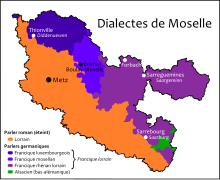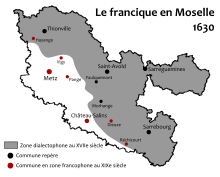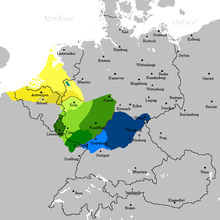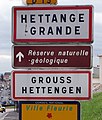lingvo.wikisort.org - Language
Lorraine Franconian (Lorraine Franconian: Plàtt or lottrìnger Plàtt; French: francique lorrain or platt lorrain; German: Lothringisch) is an ambiguous designation for dialects of West Central German (German: Westmitteldeutsch), a group of High German dialects spoken in the Moselle department of the former north-eastern French region of Lorraine (See Linguistic boundary of Moselle).
| Lorraine Franconian | |
|---|---|
| Lottrìnger Plàtt | |
| Native to | France |
| Region | Moselle |
Native speakers | (c. 360,000 cited 1962) |
Language family | Indo-European
|
| Official status | |
Recognised minority language in | |
| Regulated by | No official regulation |
| Language codes | |
| ISO 639-3 | – |
| Glottolog | loth1238 Lothringisch |
| IETF | gmw-u-sd-fr57 |
 Dialects of Moselle. Those in purple areas are lumped under the term "Lorraine Franconian" when spoken in France. | |
| Part of a series on |
| Lorraine |
|---|
 |


Description
The term Lorraine Franconian has multiple denotations. Some scholars use it to refer to the entire group of West Central German dialects spoken in the French Lorraine region. Others use it more narrowly to refer to the Moselle Franconian dialect spoken in the valley of the river Nied (in Pays de Nied whose largest town is Boulay-Moselle), to distinguish it from the other two Franconian dialects spoken in Lorraine, Luxembourgish to the west and Rhine Franconian to the east.[citation needed]
The German term Lothringisch refers to Rhine Franconian spoken in Lorraine.[1][2]
In 1806 there were 218,662 speakers of Lorraine Franconian in Moselle and 41,795 speakers in Meurthe.[3]
In part from the ambiguity of the term, estimates of the number of speakers of Lorraine Franconian in France vary widely, ranging from 30,000[4] to 400,000[5] (which would make it the third most-spoken regional language in France, after Occitan and Alsatian).
The most reliable data comes from the Enquête famille carried out by INSEE (360,000 in the 1962 census) as part of the 1999 census, but they give a somewhat indirect picture of the current situation (see Languages in France for a discussion of this survey). Approximately 78,000 people were reported to speak Lorraine Franconian, but fewer than 50,000 passed basic knowledge of the language on to their children. Another statistic illustrating the same point is that of all adult men who used Franconian regularly when they were 5, less than 30% use (or used) the language regularly with their own children.[6]
Bilingual signs
References
- Joachim Herrgen, Lars Vorberger: Rheinfränkisch. In: Sprache und Raum: Ein internationales Handbuch der Sprachvariation. Band 4: Deutsch. Herausgegeben von Joachim Herrgen, Jürgen Erich Schmidt. Unter Mitarbeit von Hanna Fischer und Birgitte Ganswindt. Volume 30.4 of Handbücher zur Sprach- und Kommunikationswissenschaft (Handbooks of Linguistics and Communication Science / Manuels de linguistique et des sciences de communication) (HSK). Berlin/Boston, 2019, p. 478ff., here p. 490: „Die Binnendifferenzierung des Rheinfränkischen unterscheidet Nordrheinfränkisch, Pfälzisch (mit mehreren Unterdifferenzierungen) und Lothringisch. [...] Das Lothringische ist derjenige Teilraum des Rheinfränkischen, der [...]“
- Helmut Glück, Michael Rödel (Hrsg.): Metzler Lexikon Sprache. 5th ed., J. B. Metzler Verlag, Stuttgart, 2016, p. 410 (Lothringisch mit Verweis auf Rheinfränkisch) & 568f. (Rheinfränkisch) with the following divisions:
In the first sense:- Rheinfränkisch
- Pfälzisch
- Westpfälzisch
- Lothringisch
- Ostpfältzisch
- Südhessisch
- Westpfälzisch
- Pfälzisch
- Rheinfränkisch
- Pfälzisch, with the same meaning as Rheinfränkisch in the first sense
- Hessisch
- Mittel-, Nieder-, Osthessisch
- Rheinfränkisch
- Sébastien Bottin, Mélanges sur les langues, dialectes et patois, Paris, 1831.
- Auburtin
- Langues régionales.org (Platt lorrain)
- Héran
Sources
- Auburtin, Éric. 2002. "Langues régionales et relations transfrontalières dans l’espace Saar-Lor-Lux". Hérodote 105, pp. 102–122.
- Héran, François, et al. 2002. "La dynamique des langues en France au fil du XXe siècle". Population et sociétés 376. Paris: Institut National d'Études Démographiques (INED).
- Hughes, Stephanie. 2005. Bilingualism in North-East France with specific reference to Rhenish Franconian spoken by Moselle Cross-border (or frontier) workers. In Preisler, Bent, et al., eds. The Consequences of Mobility: Linguistic and Sociocultural Contact Zones. Roskilde, Denmark: Roskilde Universitetscenter: Institut for Sprog og Kultur. ISBN 87-7349-651-0.
- Kieffer, Jean-Louis. 2006. Le Platt Lorrain de poche. Assimil. ISBN 2-7005-0374-0
External links
- Redde-n-ìhr Plàtt ? — Historical, literary, and linguistic information (in French)
- Gau un Griis — Association for the defense and promotion of Lorraine Franconian
- Plattweb
На других языках
[de] Lothringisch (fränkisch)
Lothringische Mundarten – nicht zu verwechseln mit der galloromanischen Sprache Lothringisch – ist im weiteren Sinne eine Sammelbezeichnung für die in Lothringen gesprochenen rheinfränkischen und moselfränkischen Dialekte, inklusive Luxemburgisch, welche zum Westmitteldeutschen gehören. Sie werden in den nordöstlichen Teilen des französischen Départements Moselle gesprochen und heißen dort „Platt“, „Lothringer Platt“ oder „Lothringer Déitsch“. Auf Französisch verwendet man die Bezeichnungen patois (Platt, unspezifisch) und seit etwa 1980 francique (Fränkisch). Die deutsch-lothringischen Dialekte werden seit 1945 stark durch das Französische zurückgedrängt. Die seither geborenen Lothringer sprechen die Mundart zwar häufig noch als Zweitsprache, für die nach 1980 Geborenen ist Lothringisch aber meist höchstens noch „Großmuttersprache“. Lothringisch ist damit vom Aussterben bedroht.- [en] Lorraine Franconian
[es] Fráncico lorenés
El fráncico lorenés (también llamado lothrénger platt, lothringer platt, lothrénger deitsch, lothrìnger deitsch, lothrìnger ditsch, lothringer deutsch, o simplemente platt) es una de las lenguas regionales de Lorena. Se trata de un término genérico que designa todos los dialectos del alemán central y del alto alemán que se hablan en la parte germanófona del departamento lorenés del Mosela (tradicionalmente llamada Lorena alemana).[fr] Francique lorrain
Le francique lorrain, traditionnellement appelé Lothrìnger deitsch/ditsch, Lothrìnger Platt, ou tout simplement Platt[1], est l'une des langues régionales de Lorraine. C'est un terme générique qui désigne l'ensemble des dialectes du moyen allemand et de l'allemand supérieur parlés dans la partie germanophone du département de la Moselle[N 1]. En termes de locuteurs, le francique lorrain figure en 2013 parmi les langues régionales de France les plus parlées, devant le basque et le corse mais après l'occitan, l'alsacien et le breton[2]. D'autre part, il ne faut pas confondre le francique lorrain avec le français régional lorrain, qui est un parler français ayant emprunté du vocabulaire, des expressions et des idiomes au francique lorrain.[ru] Лотарингский (франкский) диалект
Франкский лотарингский диалект (нем. Lothringisch, фр. Francique lorrain) — собирательное название для рейнско-франкских и мозельско-франкских диалектов, которые распространены в Лотарингии, включая люксембургский язык. Диалект распространён в департаменте Мозель и там называется носителями платским (Lothringer Platt, Lothringer Déitsch). Во французском языке для таких диалектов существует понятие патуа (patois), к которому долгое время причисляли лотарингский. С 1980-х в обиход вошло понятие francique (франкский), которое позволило уже точно разграничить лотарингский средненемецкий диалект от галло-романского лотарингского языка. В послевоенное время франкский лотарингский диалект стал оттесняться французским языком, подобно многим другим диалектам на территории Франции. Родившиеся после 1945 года носители диалекта владеют им как вторым языком, но уже редко считают его родным.Другой контент может иметь иную лицензию. Перед использованием материалов сайта WikiSort.org внимательно изучите правила лицензирования конкретных элементов наполнения сайта.
WikiSort.org - проект по пересортировке и дополнению контента Википедии


